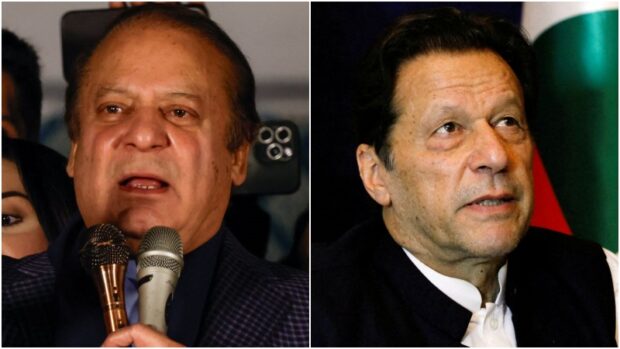Pakistan ex-PMs and bitter rivals Sharif and Khan both claim poll win

Former Pakistani Prime Ministers and bitter rivals Nawaz Sharif (L) and Imran Khan (Reuters)
ISLAMABAD — Former Pakistani prime ministers and bitter rivals Nawaz Sharif and Imran Khan on Friday both declared victory in elections marred by delayed results and militant attacks, throwing the country into further political turmoil.
Sharif’s party won the most seats by a single party in Thursday’s election, but supporters of imprisoned Khan, who ran as independents instead of as a single bloc after his party was barred from the polls, won the most seats overall.
READ: Pakistan goes to the polls after bloody election eve
Sharif said his party would talk to other groups to form a coalition government as it had failed to win a clear majority on its own.
Sharif’s announcement came after more than three-quarters of the 265 seats had declared results, more than 24 hours after polling ended on Thursday when 28 people were killed in militant attacks.
Article continues after this advertisementAnalysts had predicted there may be no clear winner, adding to the woes of a country struggling to recover from an economic crisis while it grapples with rising militancy in a deeply polarised political environment.
Article continues after this advertisementThe results showed independents, most of them backed by Khan, had won the most seats – 98 of the 245 counted by 1830 GMT.
Sharif’s Pakistan Muslim League-Nawaz (PML-N) won 69 while the Pakistan People’s Party of Bilawal Bhutto Zardari, the son of assassinated premier Benazir Bhutto, got 51.
The rest were won by small parties and other independents.
“Pakistan Muslim League is the single-largest party in the country today after the elections and it is our duty to bring this country out of the whirlpool,” Sharif told a crowd of supporters gathered outside his home in the eastern city of Lahore.
“Whoever has got the mandate, whether independents or parties, we respect the mandate they have got,” he said. “We invite them to sit with us and help this wounded nation get back on its feet.”
READ: UN warns of ‘pattern of harassment’ vs Khan’s party before election
Khan’s Pakistan Tehreek-e-Insaf (PTI) party released an audio-visual message created using artificial intelligence and shared on his X social media account.
In the message, which is usually delivered by word through his lawyers, Khan, 71, rejected Sharif’s claim to victory, congratulated his supporters on “winning” the election and urged them to celebrate and protect their vote.
“I trusted that you all would come out to vote – and you honoured that trust and your massive turnout has shocked everyone,” the message said, adding no one would accept Sharif’s claim because he had won fewer seats and because there had been rigging in the polls.Former cricket superstar Khan has been in jail since August, and was convicted three times in six days in the leadup to the polls for 10, 14 and seven years in cases related to state secrets, graft and an unlawful marriage.
Sharif, 74, a three-time former premier, returned from four years of self-imposed exile in the United Kingdom late last year, having contested the last election from a jail cell on a graft conviction.
He was considered the front-runner to lead the country, having buried a long-running feud with the powerful military.
Sharif said his party would have preferred to win a majority of its own but in the absence of that would get in touch with others, including former President Asif Ali Zardari of PPP, to open negotiations as early as Friday night.
In its first reaction, a senior aide of Khan said PTI leaders would hold talks among themselves and also meet Khan in jail on Saturday to discuss the results, Geo News reported.
Results of the vote have been unusually delayed, which the caretaker government ascribed to the suspension of mobile phone services – a security measure ahead of the election.
Independent members cannot form a government on their own under Pakistan’s complex election system which also includes reserved seats that will be allotted to parties based on their winnings.
But independents have the option to join any party after the elections.
Challenges for coalition
“A timely announcement of the results, leading to a smooth formation of a new government, will reduce policy and political uncertainty,” Moody’s Investors Service said. “This is crucial for the country that is facing very challenging macroeconomic conditions.”
The delay in the announcement of results was unusual for Pakistan. Karachi’s stock index and Pakistan’s sovereign bonds fell because of the uncertainty.
The main electoral battle had been expected to be between candidates backed by Khan, whose PTI won the last national election, and the PML-N. Khan believes the powerful military is behind a crackdown to hound his party out of existence, while analysts and opponents say Sharif is being backed by the generals.
The military has dominated the nuclear-armed country either directly or indirectly in its 76 years of independence from Britain but for several years it has maintained it does not interfere in politics.
Analysts say a coalition government will struggle to tackle multiple challenges – foremost being seeking a new bailout programme from the International Monetary Fund (IMF) after the current arrangement expires in three weeks.
A coalition government “would probably be unstable, weak” and “the big loser … will be the army”, said Marvin Weinbaum, Director of Afghanistan and Pakistan Studies at the Middle East Institute in Washington.
“Because the army really has staked its reputation on its ability to deliver this vote.”
The election was expected to help resolve the crises Pakistan has been dealing with but a fractured verdict “could very well be the basis for even deeper exposure to forces which would create instability”, he said.